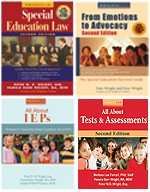What's In Store at Wrightslaw?
![]()
Special Ed Law & Advocacy Training (6.5 hrs)
25% Off the Wrightslaw Bundle of 4 PRINT books for $58.35 (Sorry, coupons not accepted on this product)
Includes Wrightslaw: Special Education Law, 2nd Ed., Wrightslaw: From Emotions to Advocacy, 2nd Ed., Wrightslaw: All About IEPs and Wrightslaw: All About Tests and Assessments, 2nd Ed.
New! The Wrightslaw Bundle is now available as an immediate PDF download. All four Wrightslaw books as PDFs for just $49.95!
![]()
Before You Retain a Lay Advocate, by Jennifer L. Bollero, Esq.
Before you hire a lay advocate, make sure the advocate is:
Properly trained in special education law
To date there is no regulatory framework to assess the competency for a lay, non-attorney advocate in special education. There is no uniform test or certification for these advocates, and they differ widely in their capabilities and experience. Thus, a smart parent consumer will verify that these advocates have taken formal training in the rules and regulations of special education, via workshops, university programs, or other training.
Experienced in Special Education matters
Parents
should ask lay advocates for a summary of their practical experience
in special education matters.
How many IEP meetings have they attended?
What sort of cases have they handled in the past, and with what
results?
Which school districts have they encountered?
When do they call in an attorney?
It is essential that every advocate be able to answer this last question clearly. Every IEP dispute can become legally complex quickly. Good lay advocates have attorneys whom they can recommend (and hopefully with whom they have worked before) to a client if necessary.
All lay advocates should be clear in their own mind when their job has transformed from one of accompanying a parent through the predictable maze of special education to actually giving legal advice about what to do next. The latter is, by law, the province of the attorney. A good lay advocate will be very careful about making an actual legal judgment or recommendation to a client without first checking with an attorney.
Professional in Demeanor
Lay advocates who represent parents often come to the job, as do special education attorneys, because they have children with special needs.
Attorneys and lay advocates who are themselves parents of special needs children need to separate their own experiences from those of their clients. By that, I mean they must keep foremost in their minds the child at hand, not their own child. This is especially true if the experience the advocate had with his or her own child was negative.
In my role as a mediator I have seen lay advocates who are as professional as attorneys. I have also seen many who are not. An unprofessional advocate will do more harm than good.
Well Supported at the Office
Like attorneys, lay advocates should have reliable communication with their clients by phone and email. They should also give regular status reports to their clients and be able to manage the research and meeting demands of the cases.
Clients should feel that the lay advocate gave them sufficient time and attention, and explained the proceedings clearly. Although lay advocates do not have a recognized legal privilege, they should keep all confidences and should not discuss the case in any place where they could be overheard.
Sensitive to the Needs of the Child at Hand
The lay advocate must be able to reconcile the remedy to the needs of the child at hand. That is, the advocate must have a firm grasp of the distinguishing facts of the case as opposed to the facts of other, similar cases the advocate may have handled.
Parents should believe that the advocate has tailored the remedy to the unique needs of their child, and not just attempted a remedy that is typical for children with a similar disability, or even another client with a similar disability.
Sensitive to the need of the client to make the final decision
Like an attorney, the advocate must offer options to the client with which the client can live. Similarly, the advocate must accept the client’s decision with regard to the many options available, and not interject too much the advocate’s own preference for one remedy or course of action over another.
About Jennifer Bollero
Ms. Bollero received her undergraduate degree from Northwestern University and her Juris Doctor degree from Loyola University of Chicago School of Law. She is a former member of the adjunct faculty at Elgin Community College Paralegal Program, and serves on the Professional Advisory Committee of the Autism Society of Illinois and the Illinois Attorney General's Special Committee on Special Education. Ms. Bollero is a former special education mediator for the Illinois State Board of Education. She has authored numerous articles on special education and has conducted a variety of seminars on school topics in Illinois and nationally. In her seminars, she teaches how to effectively, calmly, and productively navigate an I.E.P in a way that everyone "Plays well together". She brings years of personal as well as professional experience. She will show us how Playing Hearts Not Poker is in the best interest for our child.
Copyright © Jennifer Bollero, Esq. All rights reserved. Do not use without permission.
Contact
Information:
Email: jlbesq@juno.com
Copyright © 1998-2022, Peter W. D. Wright and Pamela Darr Wright. All rights reserved. Contact Us
